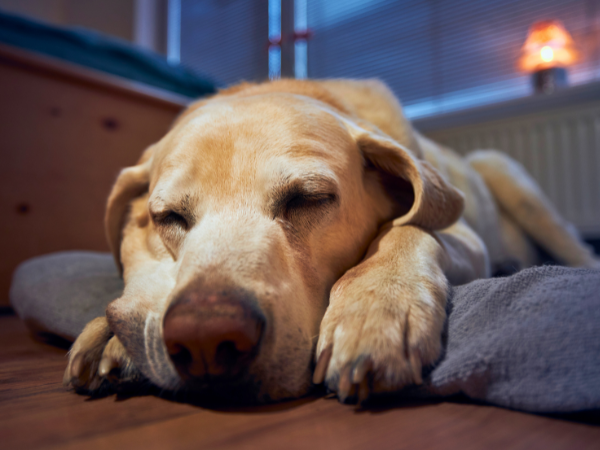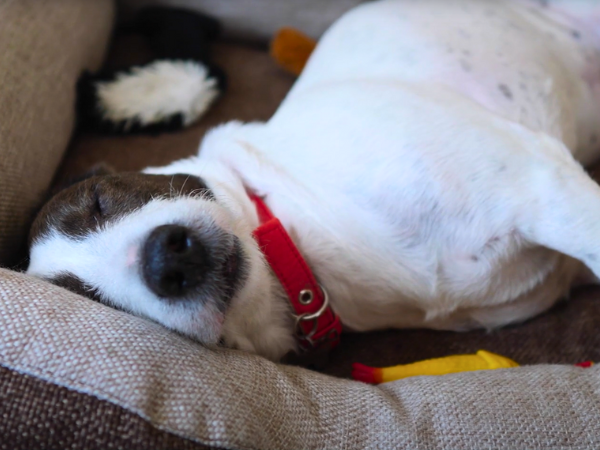From anxiety to health concerns, there are several reasons your dog might struggle to relax after dark. In this guide, we’ll cover seven common causes of nighttime panting and what you can do to help your pup sleep more comfortably.
Normal Body Regulation
Dogs pant to regulate their body temperature. This natural process keeps them cool and comfortable. At night, panting may occur even without obvious heat. Factors like room temperature, bedding, and the dog’s breed affect this behavior.
Several reasons explain why dogs pant more at night:
- Can be caused by a hot room: A bedroom that is too warm, especially with thick blankets or an overly warm bed, can raise a dog’s body heat.
- More common in senior dogs: Older dogs might pant more as their bodies regulate temperature less efficiently.
- Breeds with thick coats: Dogs with dense fur struggle more to cool down, leading to increased panting.
Panting is a key way dogs cool themselves. Unlike humans, dogs do not sweat through their skin. Instead, they rely on panting to evaporate moisture from their tongues, mouths, and upper respiratory tracts. This evaporation helps lower their body temperature.
Anxiety And Stress
Many dogs show signs of stress and anxiety at night. Loud noises, like thunderstorms or fireworks, can cause anxiety. These sounds may startle dogs and make them pant more than usual. Another common cause is separation anxiety. Dogs may feel lonely or scared when left alone at night.
Signs of nighttime anxiety in dogs include:
- Pacing around the room.
- Whining or vocalizing.
- Destructive behavior like chewing furniture.
- Excessive panting without physical activity.
- Restlessness or inability to settle down.
Dog panting at night can be a normal way for dogs to cool down. But sometimes, panting shows anxiety and stress. Dogs feel emotions deeply, just like people. Nighttime can be hard for dogs with anxiety. The quiet and darkness can make their worries worse.

Pain And Discomfort
Dog panting at night can be normal, especially after activity or in warm weather. Yet, persistent or heavy panting may signal pain and discomfort. Dogs cannot speak to tell us they hurt. Instead, they use behaviors like panting to show distress.
Panting might be a symptom of:
- Arthritis – Joint pain can cause constant panting and restlessness.
- Recent injury – Even small wounds or sprains can lead to discomfort and panting.
- Internal issues – Problems like stomach pain or infections may trigger heavy panting.
Dogs in pain often pant as a response. This panting is not from heat or exercise but from discomfort inside their body. Pain can make dogs restless and uneasy. They may pace or shift positions often, unable to find comfort. These actions can be easy to miss at night.
Brachycephalic Breeds
Dog panting at night can be normal or a sign of a problem. For brachycephalic breeds, this behavior deserves special attention. These breeds have short snouts and flat faces that affect how they breathe. Common examples include Pugs, Bulldogs, and Shih Tzus.
Here are some reasons why brachycephalic breeds pant more:
- Narrowed nostrils reduce airflow through the nose.
- Elongated soft palate blocks the airway partially.
- Smaller windpipe limits the air passage.
- Collapsed trachea can occur, worsening breathing.
Breeds with short snouts, like Pugs and Bulldogs – are prone to panting. Their anatomy makes breathing less efficient. Their unique facial structure often causes breathing difficulties, which can lead to more frequent panting, especially at night.
Medication Side Effects
Dog panting at night can be normal, but sometimes it signals a problem. One common cause is medication side effects. Certain drugs your dog takes may lead to increased panting, especially during rest or sleep.
Here are some points to consider if your dog pants more after starting medication:
- Panting might increase in the first few days.
- It can occur even if your dog is calm or resting.
- Other side effects could include increased thirst or restlessness.
Some medications, such as corticosteroids (prednisone), can cause panting. This is a common side effect to watch out for. Panting may start soon after your dog begins a new prescription. It can be mild or more noticeable depending on the medication and your dog’s sensitivity.

Serious Medical Conditions
Panting is a common way for dogs to cool down. At night, panting might seem normal after a busy day. But sometimes, it can point to serious medical conditions. Certain illnesses can cause panting that needs attention. Ignoring these signs might make your dog suffer more.
Not all panting is harmless. Conditions like heart disease can cause fluid buildup, making it hard to breathe.This leads to increased panting, especially at night when your dog lies down. Coughing or weakness may also appear.
Cushing’s Disease often causes increased panting. Dogs may also drink and urinate more than usual. This disease affects hormone levels and can worsen without treatment.
Respiratory issues can also cause abnormal panting. Problems in the lungs or airways make breathing difficult. Your dog might cough, wheeze, or have nasal discharge.
| Condition | Key Symptoms | Effect on Panting |
|---|---|---|
| Heart Disease | Fluid buildup, cough, weakness | Heavy, labored panting |
| Cushing’s Disease | Increased thirst, urination, weight gain | Frequent panting |
| Respiratory Issues | Coughing, wheezing, nasal discharge | Rapid, strained panting |
These signs show your dog needs a vet check-up soon. Early diagnosis can prevent serious problems. Keep an eye on your dog’s breathing, especially at night.
When To See A Veterinarian
Dog panting at night can be normal, especially after exercise or warm weather. Yet, it may also signal health issues needing attention. Not all panting is dangerous, but some signs require fast action. This section guides you on what to watch forand when to seek professional help.
Some panting during the night is normal, but persistent or excessive panting could mean a problem. Consult a vet if panting does not improve or worsens over time. Watch your dog closely for other symptoms that may signal serious issues.
- Rapid or heavy panting that lasts more than 20 minutes without obvious cause.
- Panting with difficulty breathing or noisy breaths.
- Blue or pale tongue and gums, showing poor oxygen levels.
- Lethargy, weakness, or sudden collapse.
- Excessive drooling or signs of pain.
- Fever or shaking along with panting.
- Restlessness or inability to settle at night.
Seek immediate care if panting is paired with a blue tongue, lethargy, or collapse. These signs can indicate a life-threatening emergency like heart or lung problems. A professional diagnosis is crucial for serious underlying causes.

